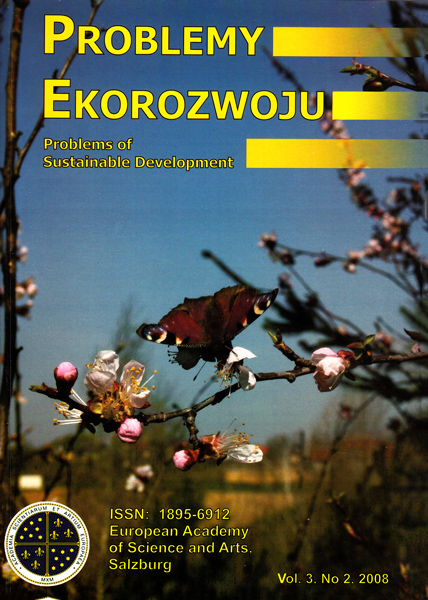Selected Aspects of Environmental Processes in Holistic Nature Related Education in the Light of Sustainable Development Concepts
Article Sidebar
Issue Vol. 3 No. 2 (2008)
-
Is There a Best Ethic of Sustainable Development?
Paul T. Durbin5-14
-
From Sustainable Development to Management of Sustainable Ecosocial Systems
Johann Baumgärtner15-19
-
Perspectives and Problems in Sustainable Development
Antoni Sánchez21-23
-
Sustainable Value
Chris Laszlo25-29
-
Eco-Humanism and Popular System Dynamics as Preconditions for Sustainable Development
Lesław Michnowski31-50
-
Albert Schweitzer’s Ethics of Respect for Life and Ecophilosophy
Zdzisława Piątek51-61
-
Sustainable Development – Utopia or Real Possibility?
Lech W. Zacher63-68
-
Selected Aspects of Environmental Processes in Holistic Nature Related Education in the Light of Sustainable Development Concepts
Jan Sandner69-80
-
Does Technology Support Sustainable Development?
Konrad Waloszczyk81-88
-
Renewed EU Sustainable Development Strategy: What Does it Mean for Poland?
Lesław Michnowski89-128
-
Sustainable Development from Reverse Logistics Perspective
Adam Sadowski129-132
-
Reflection About Sustainable Development (Is Sustainable Development Fiction, Utopia, Illusion or Swindle?)
Wiesław Sztumski133-139
-
Book Review: Chris Laszlo, Sustainable Value: How the World’s Leading Businesses Are Doing Well by Doing Good, Standford University Press, 2008
Artur Pawłowski141-142
-
Book Review: Chris Laszlo, Sustainable Value, 2008
Artur Pawłowski143
-
Book Review: John Ikerd, Crisis and Opportunity: Sustainability in American Agriculture, University of Nebraska Press, 2008
Artur Pawłowski145
-
Book Review: John Ikerd, Small Farms Are Real Farms: Sustaining People Through Agriculture, University of Nebraska Press, 2008
Artur Pawłowski147
-
Book Review: Zdzisława Piątek, Pawi ogon, czyli o biologicznych uwarunkowaniach kultury, Wydawnictwo Uniwersytetu Jagiellońskiego, 2007
Ignacy S. Fiut149
-
Letter to the Editorial Office: Professor Henryk Skolimowski Answers
Henryk Skolimowski153
-
Letter from the President of the European Academy of Science and Art
Felix Unger155
Archives
-
Vol. 5 No. 2
2010-07-01 21
-
Vol. 5 No. 1
2010-01-04 16
-
Vol. 4 No. 2
2009-07-01 19
-
Vol. 4 No. 1
2009-01-05 22
-
Vol. 3 No. 2
2008-07-01 19
-
Vol. 3 No. 1
2008-01-02 12
-
Vol. 2 No. 2
2007-07-02 13
-
Vol. 2 No. 1
2007-01-02 11
-
Vol. 1 No. 2
2006-07-03 15
-
Vol. 1 No. 1
2006-01-02 8
Main Article Content
Authors
Abstract
The problem of comprehending environment related problems depends not only on the development of natural sciences as such, but also on their cooperation on an interdisciplinary level. Frequently this proves, however, to be difficult to implement, as in the majority of cases those sciences are characterised by a diverse study 70 (Jan Sander/Problemy Ekorozwoju nr 2 (2008) , 69-80) methodology, and have differing specialist vocabulary, which frequently leads to “incompatibility” of gained test results. Such “incompatibility” may be related to a completely different interpretation of the same natural phenomena. The absence of a standardised and concurrently a well-defined approach to problems of environmental protection may be observed already at the level of elementary notions. The most widespread example of such arbitrariness is rather free use, frequently in an interchangeable way, of such notions as: ecology and environment protection, or ecosystem and the biosphere. Those notions are in many cases used as convenient counterparts. In the article the author discusses certain aspects related to with levels of biological organisation, which should be used as a base for all deliberations related to a holistic natural environment. On the basis of knowledge gained in ecology (created from biological sciences), the appropriate reference level should be sought to allow comprehending natural processes, which are taking place on higher levels in the system. Cognition of the natural environment on a holistic level is indispensable if we want to understand processes of its degradation, and simultaneously of the anthropospheric position of man and the role of community groups in that process. Increasingly frequently an important contribution to the interpretation of a holistic approach to environmental processes is made by Ecophilosophy which continues to develop dynamically. By studying social, political, ideological and economic considerations and consequences of interactions between man and the surrounding environment Ecophilosophy needs to be based as a system on processes, the nature of which is holistic. This is necessitated by the complexity of analysed problems, a part of which is verifiable empirically, yet their remainder tends to remain outside of reach for empiricism. This latter part should certainly be subject to philosophical way of thinking, albeit not in detachment of the first group. The article refers to elementary system notions from the borderland of various sciences (Biology, Ecology, Ecophilosophy), which are connected with cognition of the natural environment, consequently affecting formulation of a methodology to allow correct shaping of the pro-ecological education process.
Keywords:
References
ALEKSANDROWICZ J., Sumienie ekologiczne, Wydawnictwo Wiedza Powszechna, 1988, wyd. 2.
DOŁĘGA J.M., Zarys sozologii systemowej, Wydawnictwo UKSW, Warszawa 2005, s. 230.
KREBS CH.J., Ekologia, Eksperymentalna analiza rozmieszczenia i liczebności, Wydawnictwo PWN, Warszawa 1996, s.734.
KREBS J.R., Davies N.B., Wprowadzenie do ekologii behawioralnej, Wydawnictwo PWN, Warszawa 2001, s.424.
KURNATOWSKA A., red., Ekologia i jej związki z różnymi dziedzinami wiedzy, Wydawnictwo PWN, Warszawa 1997, s.290.
ODUM E., Podstawy Ekologii, Wydawnictwo PWRiL, Warszawa 1982, s.660.
RYSZKIEWICZ M., Ziemia i życie, rozważania o ewolucji i ekologii, Wydawnictwo Prószyński i S-ka, Warszawa 1995, s.286.
SANDNER J., Idea zrównoważonego rozwoju w holistycznej edukacji przyrodniczej, Problemy Ekorozwoju, Studia Filozoficzno-Sozologiczne, vol. 2, Nr 2, Lublin 2007.
SKOLIMOWSKI H., Filozofia żyjąca. Ekofilozofia jako Drzewo życia, Wydawnictwo Pusty Obłok, Warszawa 1994.
SOUTHWOOD R., Historia Życia, Wydawnictwo Świat książki, Warszawa 2004, s.304.
TAMMILEHTO O., I. Miesięcznik Trochę Inny, Nr 1, 1990
WEJNER J., Życie i ewolucja biosfery, PWN, Warszawa 2003, s.607.
ZIĘBA S., Historia myśli ekologicznej, Wydawnictwo KUL, Lublin 2004, s.363.
Article Details
Abstract views: 54
License

This work is licensed under a Creative Commons Attribution-ShareAlike 4.0 International License.


